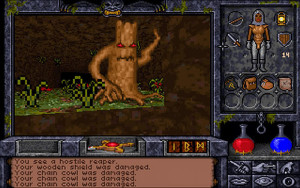RPG Design: There’s a Reaper in the Basement
Posted by Rampant Coyote on February 23, 2016
 Lord British has a very powerful Reaper in his basement in Ultima Underworld II: Labyrinth of Souls. This is a problem. But maybe not in the way you expect.
Lord British has a very powerful Reaper in his basement in Ultima Underworld II: Labyrinth of Souls. This is a problem. But maybe not in the way you expect.
It’s extremely hard to defeat, but not impossible. Therein lies the rub. If it was “level appropriate,” it would be just another combat encounter. If it was clearly impossible, players would have known better than to try and take it on, and would have quickly pursued other measures to get the treasure it guards.
But instead, through the miracle of saving and reloading, that desperately improbable fight becomes merely… unfair and frustrating. That slim chance becomes a matter of patience.
That’s how we play today. Honestly, that’s how I played it back in 1993. My impression was, “Wow, they decided to make this game really hard, huh?” Many other players had an even worse reaction, along the lines of “those stupid developers don’t know how to balance this game!”
But no, the whole point was to encourage you to try a non-combat solution. To encourage you to be clever. Eventually, Looking Glass got it right, with the Thief series, but they did it by constraining the environment and the tools. Even when you were doing exactly what the developers expected you to do, you felt like you were cheating. But in a more open-ended RPG, this is still a problem.
I think more options and multiple solutions to a challenge are more than just a good thing in most RPGs. While I accept the nature of the computer-controlled RPG universe, I’d also argue the ability to apply many different approaches to a challenge is part of the heart of the RPG experience – having real choices. So how can we make something like this work?
Now, I could lay the blame on the ease of saving and restoring, but that’s only a small part of it. Ultimately, the player has to be made aware of three things:
#1 – That a direct confrontation is undesirable.
#2 – That alternatives exist
#3 – That choosing alternatives will not be punished
The first one can be done directly, through something like a stats or “conning” to let the player know immediately if they are outclassed or not. It can also be done via suggestion, either through lore or seeing another character get horribly defeated by the beast. However, since the whole idea of a heroic RPG is playing a character who is an exception and who succeeds where others fail, that may be not be enough. Another issue is that in an RPG, the player character’s power level is dynamic, and so it’s never really clear if he may be “tough enough” to take on a particular challenge until too late. It can also be done by letting the player try and fail, but that really just trains them to save more frequently.
In the second requirement, this is also an instruction thing. This can be done by some kind of tutorial-like suggestion, or (better) by the player witnessing the alternatives being exercised by other characters. Or maybe there’s a flashback scene that acts like a tutorial. Whatever the case, the player needs to be taught the options that exist in this games’ universe. There are too many games where that isn’t an option for this to be assumed.
In the third requirement, “punished” means the player won’t miss out on rewards available from combat (mainly experience points). This can be either by rewarding the player equally no matter how he or she resolves a challenge, or by leaving an implied promise that the player can always come back later when more powerful and finish the monster off for full credit. The game system has to make good on these promises though – the rewards have to be equal. And there can’t be any kind of “bonus” for defeating much-harder opponents. That just encourages players to brute-force their way through the hardest encounters.
Whichever options are applied, it’s not an easy thing… even with today’s computers where you aren’t worried about running into the memory limits of 640k low memory.
Filed Under: Design - Comments: 2 Comments to Read

Charles said,
Excellent timing. As I delve more into Sovereign lately, I’ve been considering this exact issue. If the missing piece is at the other end of the world, how do I subtly get the player to let it go for now or pursue it, all the while not making it a boring and tedious string of fetch quests?
UW had this, but the world was contained in a mountain. Not finding the conjurer or the alchemist right away was OK, they aren’t very far off no matter which direction you choose. But if they’re in the Sahaali desert, mapping the tundra isn’t going to get you any closer and there needs to be something there to indicate that without being too straight forward.
It’s a blast 🙂
T2.0 said,
If only games that don’t allow different kinds of approaches to solve problems weren’t called RPGs (because they simply aren’t – they borrow mechanics from the genre but not its essence, that is to say freedom, or at least, regarding computer programs, the illusion of freedom), your problem would be solved – as every player would know for a fact that, in this particular kind of games, brute-force is nothing more than an option among others. Unfortunately, it seems the term RPG has been misused right from its appearance in the video game world – which indeed, makes your job more complex.